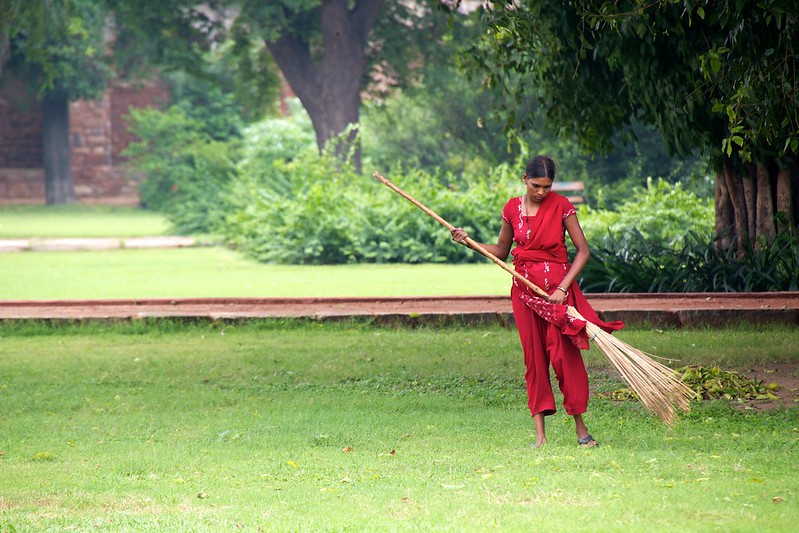The pandemic caused by COVID-19 and subsequent lockdown has held a mirror up to our inner selves. The movement of lakhs of people, who suddenly stopped being Indians but became migrants in the media and policy discussions, left the country and the world shocked at the level of mismanagement and lack of planning by the state to ensure people got to their homes safe and secure. Among the varied reactions, a common middle-class one was to berate the workers for wanting to rush off. No amount of exposés on shops and factories shutting, and workers not receiving their salaries and other dues could shake such people from their ranting. According to estimates from a month ago published in a report in The Indian Express, more than 11 lakh from Maharashtra and 20 lakh from Gujarat have returned to their home states, and UP and Bihar have confirmed over 20 and 10 lakh workers have returned. These are possibly still not reflecting the reality and the gravity of the situation because The Economic Survey of 2017 had placed interstate migration at 60 million. What the returning workers’ numbers show us is the desperate situation the working class is in, and how inconsiderate as a society we have been, not to mention how the state’s laggardly moves have exacerbated the situation.
Across social media in India (and possibly in other parts of the world), there were a number of memes and jokes, and some full-fledged articles and social media posts, on how those of us privileged enough to still have enough food on the table and a roof above our heads are suffering. The reason for this venting has been the lockdown which prohibited people from leaving their homes and letting outsiders in, to contain the transmission of the corona virus. This meant that we would have to do without that invisible work force that all of us are so used to having around – our bai, didi, bhaiya, maali, ayah, menial, maidservant, domestic help – known differently according to our location, but with one common factor tying them all. They belong to that section which allows us to reach our potential in our (professional) lives, but are seldom acknowledged in a manner that is fitting to their contribution. They perform various tasks for us such as cleaning and dusting the house, washing utensils, taking care of children and pets, cleaning vehicles, driving, cooking, running errands, etc.
According to the International Labour Organisation, the terms of employment of domestic workers are often not clearly laid out, and they tend to get excluded from labour legislation in various countries. Poor working conditions, long hours and in some cases violence and sexual exploitation are among the many problems faced by domestic workers. The Domestic Workers’ Convention (C.189), introduced in 2011 and finally ratified in 2013, was aimed at addressing the issues faced by domestic workers in a bid to provide security and dignity of labour and making visible this form of work which has tended to be undervalued, underpaid and marginalized. Women form more than 80% of this workforce, while children tend to not even be counted even when they do perform domestic labour for a remuneration that is much lower than what adults would get. About half of the people in this sector do not have any leave, be it weekly or annual offs.
India, despite being a signatory to the ILO Convention, has not ratified the treaty by bringing in suitable legislation to ameliorate the situation of about 4 million people (possibly closer to 50 million, as there is no proper data) employed in this sector. While domestic workers have come under the ambit of the law in limited ways, in the sense that there are laws regarding minimum wages, social security, sexual harassment at the workplace etc. in India, the problem lies in specifically addressing domestic workers’ problems within these. For instance, the wages of domestic workers are often fixed in arbitrary ways – sometimes piecemeal work is identified, such as sweeping and mopping, washing utensils, washing clothes, and a fixed amount per job is calculated, say Rs. 1000/- per job, making the total for those outlined above Rs. 4000/-. What is not counted here is, for instance, the folding of clothes, or the drying and keeping away of utensils, which are actually separate jobs that are time consuming as well. Heaven forbid anyone in a colony or apartment complex from upsetting the rates – the whole community could gang up against you. Again, depending on the place you are from, the rates would vary considerably – Delhi possibly is considered more expensive as far as wages for domestic workers is concerned, while cities like Patna or Bhubaneshwar have much lower rates in general.
And then there are those of us who think because we offer a bowl of ice-cream or a snack or meal to the workers, we can get them to oil our hair, press our feet, give us body massages etc. for free. These are extras that are seen as rewards for our own acts of kindness and charity. For many, they are not counted as work, in terms of requiring remuneration! A domestic worker told me that her employer asks her daughter, a bright young girl, to come in the afternoons to press her head and feet, and despite the young girl protesting that she was too tired after returning from school, the lady was forced to send her as she feared she would be removed from the job otherwise. The argument of the employer was that the girl would actually be benefitting as she would be sitting in an airconditioned room. Related to this is the issue of work time. Since hours are not always clearly fixed, the worker is forced to accommodate demands couched as requests, and possibly give up on time she would have assigned for her own household and care-giving chores. In cities like Mumbai, Bengaluru, Hyderabad etc. this is not such a major problem anymore as it suits both the employer and employee to have fixed time slots for the domestic worker to undertake the jobs, but in large parts of north India, the demand is that the worker spend at least a couple of hours in the house. In Kolkata, I was informed that in some localities, the calculation of wages of domestic workers is on a daily basis, and there are fixed days of the week when the workers are expected. These may be welcome trends, but it appears that the situation still is loaded against the domestic worker.
In many households across the country, child labour is employed for various kinds of light and heavy domestic work. From minding children who are younger, and sometimes even of the same age, to dusting, polishing, and performing odd jobs, these children often live in pathetic conditions if brought to stay within the domestic space. Often, debts of parents are sought to be settled by employing these children, and so there is no actual wage given. Where a wage is fixed, these are generally not handed over to the child, and at the time of settlement, several discrepancies are found in the accounts. Despite laws prohibiting child labour existing for several decades now, these are being blatantly disregarded even by those in government service and in the higher education sector, and children are being employed for domestic purposes, as several news reports from across the country have revealed.
Dignity of labour is one of the major issues raised by several domestic workers, according to many reports. Among those whom I had spoken to in an affluent locality of Delhi, a young man who doubles up as the cleaner and gardener for an officer in his institution, said that he is not allowed to sit even on the floor inside the house that he cleans everyday, and there are separate utensils in which he is served tea or water and snacks. Another worker is not served food in the house she works in, although she not only cleans the house but also cooks the food here. She tearfully told me of an incident where her employer, who before the lockdown used to leave a small cup of tea for her, told her that this would not be possible now since she was no longer going to office due to the pandemic, and needed to have a mid-day cup of tea; hence, she couldn’t spare the milk. The same worker was expected to go into the employer’s house at dawn, make the bed-tea, cook breakfast, etc. An interesting (and quite obnoxious) chore she mentioned was standing at the foot of the stairs holding a glass of lemon and honey mixed warm water at 8 am sharp, waiting for the daughter of the employer to come down; in case the girl was late, she had to keep waiting. A woman who worked in the same neighbourhood mentioned that she had been slapped quite a few times by her employer. But she still stayed on because after such an incident the employer would cajole her and be very nice to her; on occasion, she would even buy a saree for her.
Another worker mentioned that although she stayed with the family that employed her, she was never given the same food that was served to the family. Yet another worker mentioned that a different quality of rice was cooked for him and other workers. The caste and religious dimension adds to this discrimination in many parts of the country. So while the need for the worker leads to a compromise as far as employing Dalits by so-called upper caste households, there are ways in which the hierarchies are enforced – separate cutlery and crockery, food, entrance etc. A Dalit woman working in an upper caste home said that she was often given food to take home in used milk packets or wrapped in newspapers. The same person mentioned how she was given a lot of brass objects to wash and polish as there was daily worship carried out in the household she worked in. But once the worship started, she was strictly forbidden from going anywhere near the room where it was being done. Another worker in a plush neighbourhood mentioned that although she was the cook, the ingredients would be set out by the employer, and on occasion, the latter would loudly comment about how quantities of either the cooked food or ingredients seemed depleted. The worker did not miss the insinuation.
A very major issue for many domestic workers, which has been partly resolved in apartment complexes which now provide common conveniences, is the lack of access to toilets. Domestic workers are still mostly not allowed to use the same toilets as their employers, and often they have to run to the public conveniences, often lacking water, in the neighbourhood to relieve themselves. This is indeed ironic because the same employer who wishes to have a clean house forces the worker into unhygienic conditions, causing all kinds of infections, not to mention the sense of uncleanness felt by the worker. At an institution of higher learning with a sprawling campus in south Delhi, a worker mentioned that she still goes into the wilderness to relieve herself and has on a few occasions narrowly escaped being bitten by a snake.
The greatest difficulty for most workers is lack of security of job; they can be summarily dismissed with no consideration for their situation, and often denied their full wages. In cases where the workers demand their rights, or protest against something, there are accusations of theft and wrongdoing made against them. They tend to be helpless in these situations, and the fear of facing the police or being thrown out of employment is enough to make them gulp their anger and suppress the sense of being unfairly treated. A feudal and colonial concept called the servant quarter (SQ) adds to the weight shouldered by the domestic worker. It seems that those who are ‘given’ these by their employers, are meant to be at the beck and call of their masters and mistresses. They cannot protest over the quantum of work, the unfair treatment meted out to them, or to have free time to themselves. Many are not given salaries on the grounds that the quarter was worth more than the salary deserved by the worker. This also means that the position of the worker is all the more precarious, for if she is asked to vacate, it would mean a dislocation for her entire family. Obviously there are differences of location – many prefer the SQs of the defence service officers or higher level government officials, compared to those in private homes as well as in campus-based institutional settings, although the reasons are not fully clear. The primary concern is regarding the lack of cash in hand for these workers in SQs, for while they will not pay them, at the same time employers generally frown upon the worker seeking other additional employment. These workers find themselves in the difficult position of sending their children out to work simply to bring in some income to run the family, despite their yearning to educate the kids and better their lives.
With the lockdown easing since last month, there have been sighs of relief all around, but more so from the middle class that can now welcome back their domestic workers. Most of us who have withdrawn from a number of household chores, partly because of our professional pressures, but also because we have the privilege to do so, have been forced to revisit these and physically invest our labour in domestic work in addition to our office work, leaving little room for any extras. The lockdown has brought home to us just how much we depend on these workers who have made our lives not only easier, but without whom we could not have fulfilled our professional obligations. For the worker, the lockdown meant in many cases being laid off, and the misery of staying in cramped spaces with abusive spouses, with barely enough to get by. Many have rushed back to work in the homes of their former employers, despite not having been paid for the past three months. The Domestic Workers (Regulation of Work and Social Security) Bill 2017 tabled in Parliament is yet to see any movement, and as such no national level policy to regulate the rights and working conditions of domestic workers exists. While we do need laws to protect domestic workers (and other categories of workers in the informal sector), what is as important for us to recognize is the structural inequality and utter exploitation implicit in the relationship between the domestic worker and the employer in our society, where caste, class and gender interstice in insidious ways. The laws by themselves would be meaningless, if we don’t look closely at ourselves and the way in which we treat those who toil hard to give us our comfortable lives. Some of us do make an effort to break this unequal relationship: some share their meals with their workers, are very mindful of the time and work done by them, share in their joys and sorrows as they would in ours. But these individual efforts are meaningless, if there is no structural change, if we don’t acknowledge how social disprivilege in terms of caste and other exclusions have a heavy bearing on the way we treat domestic workers, and if we do not stop designating our housework as menial labour.
R. Mahalakshmi is Professor at the Centre for Historical Studies, Jawaharlal Nehru University, New Delhi.











